 Petzlover
Petzlover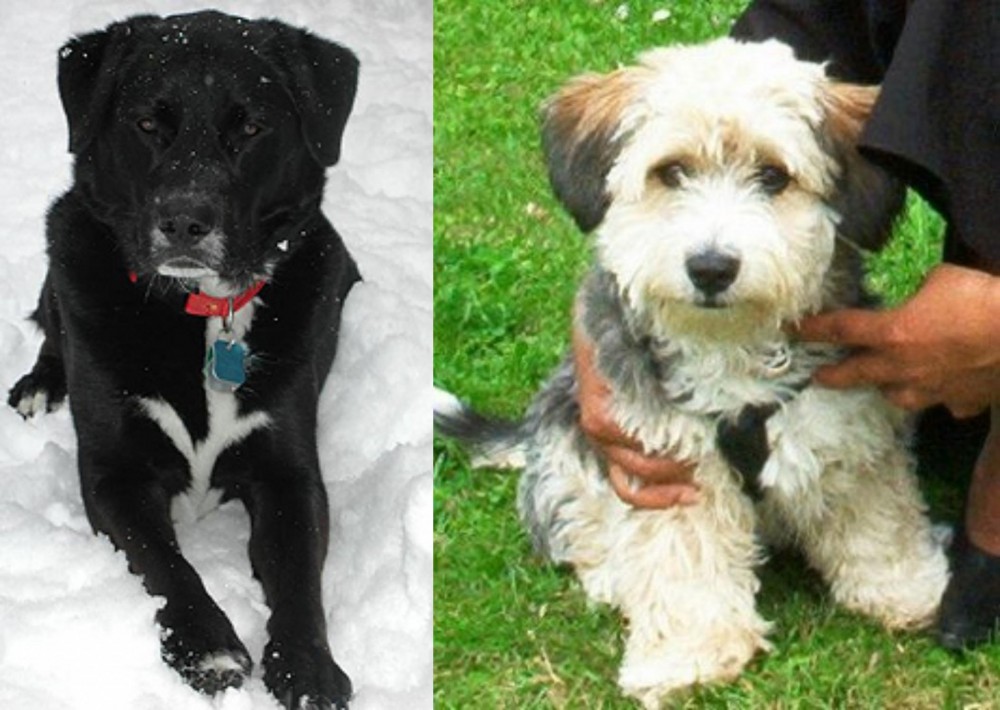 St. John's Water Dog is originated from Canada but Yo-Chon is originated from United States. St. John's Water Dog may grow 23 cm / 10 inches higher than Yo-Chon. St. John's Water Dog may weigh 37 kg / 82 pounds more than Yo-Chon. Both St. John's Water Dog and Yo-Chon has almost same life span. Both St. John's Water Dog and Yo-Chon has same litter size. St. John's Water Dog requires Low Maintenance. But Yo-Chon requires Moderate Maintenance
St. John's Water Dog is originated from Canada but Yo-Chon is originated from United States. St. John's Water Dog may grow 23 cm / 10 inches higher than Yo-Chon. St. John's Water Dog may weigh 37 kg / 82 pounds more than Yo-Chon. Both St. John's Water Dog and Yo-Chon has almost same life span. Both St. John's Water Dog and Yo-Chon has same litter size. St. John's Water Dog requires Low Maintenance. But Yo-Chon requires Moderate Maintenance
 The breed known as the St. John’s water dog is an extinct landrace breed. They were domestic dogs found in Newfoundland and at times were called the lesser Newfoundland. There is not much information available about the other breeds that went into its development. Hypothetically it is believed they are a mix of the Irish, Old English and Portuguese dogs bred to work.
The breed known as the St. John’s water dog is an extinct landrace breed. They were domestic dogs found in Newfoundland and at times were called the lesser Newfoundland. There is not much information available about the other breeds that went into its development. Hypothetically it is believed they are a mix of the Irish, Old English and Portuguese dogs bred to work.
It is also thought that other breeds in their family tree, descending from them, include the Golden Retriever, the Flat-Coated Retriever, the Chesapeake Bay Retriever, the Labrador and the Curly-Coated Retriever. The Newfoundland is also related to the St. Johns Water Dog through the line of Rafeirio do Alenteios that Portuguese fisherman brought to the island.
The breed was exported to England in the 19th century and early 20th. There the breeds of retrievers were developed. In Canada during this time frame restrictions were placed on dog ownership in order to encourage people to raise sheep. At the same time England imposed a long quarantine on all animals coming into the country in order to get rid of rabies. These two factors contributed greatly to the extinction of the breed. It seems the last two dogs were seen in a remote area in the 1980’s. All attempts to save the breed failed.
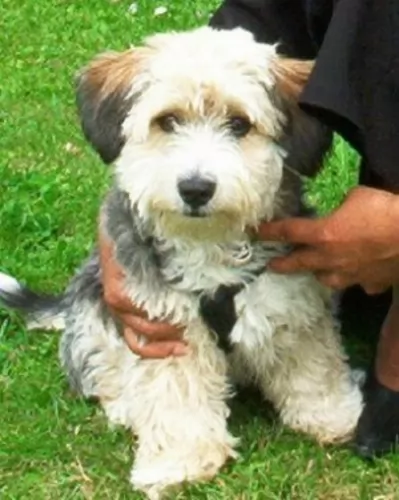 The Yorkie Bichon or Yo-Chon as he is fondly referred to as a designer crossbreed hailing from the United States.
The Yorkie Bichon or Yo-Chon as he is fondly referred to as a designer crossbreed hailing from the United States.
Information isn’t readily available on the origins of this cute little dog, but the dog is believed to be a cross between a Bichon Frise and Yorkshire Terrier.
It is thought that the dog was developed in the United States from about 1998 to 2001. As a hybrid, the Yorkie Bichon isn’t recognized by the American Kennel Club.
 St. John’s Water Dog is strong, medium sized and stocky. They looked more like English Labs than American Labs. They had a thick, short coat, loved swimming, had a lot of endurance and rudder tail. It was also described as a thin, black dog with short hair. They had white patches on their chest and feet. His nose was thin and tapered, his legs powerful, his chest muscular. The breed is quick, swims, runs quickly and is a fighter as well.
St. John’s Water Dog is strong, medium sized and stocky. They looked more like English Labs than American Labs. They had a thick, short coat, loved swimming, had a lot of endurance and rudder tail. It was also described as a thin, black dog with short hair. They had white patches on their chest and feet. His nose was thin and tapered, his legs powerful, his chest muscular. The breed is quick, swims, runs quickly and is a fighter as well.
Never accepted by any major kennel club except as a foundation breed. They became extinct.
 The Yo-Chon stands between 25 and 30cm and weighs in the region of 2 to 4kg. He can be like a teddy-bear this little dog and the coat can be either silky and straight or wavy. It is medium length and some people have the coat professionally trimmed.
The Yo-Chon stands between 25 and 30cm and weighs in the region of 2 to 4kg. He can be like a teddy-bear this little dog and the coat can be either silky and straight or wavy. It is medium length and some people have the coat professionally trimmed.
The low shedding coat comes in a variety of colors – cream, grey, tan, white, black or bi-colored.
Your Yorkie Bichon will no doubt have some habits that come from both parent breeds. Your dog is likely to be independent, social, friendly, social and loving, wanting to spend lots of time with you.
They’re small but they make good watchdogs with their high-pitch bark. Your Yo-Chon is an intelligent little dog too and by having him trained and socialized he is well behaved and pleasant to have around. You can tell him to lie down, sit or stay which is useful when you have visitors.
He gets on well with children, but the puppies particularly are tiny and fragile and they can easily get hurt by untrained and undisciplined children.
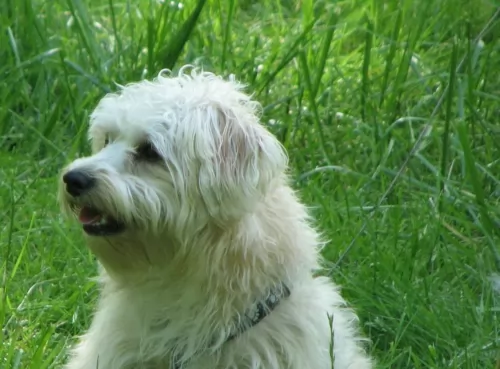 The Yo-Chon is an independent, happy dog who loves nothing more than to be surrounded by all his favorite human beings.
The Yo-Chon is an independent, happy dog who loves nothing more than to be surrounded by all his favorite human beings.
They are loving, loyal and gentle dogs and are good playmates for children who have been taught how to handle them with care and kindness.
He is smart and has an amicable nature and will take kindly to being trained and socialized.
With the Yo-Chon in your life, you can be sure you’re going to benefit from having a splendid family pet and companion.
 There is no documented history of any genetic or hereditary illnesses in the breed. However, it seems rational to believe they suffered from ailments similar to Labradors and newfoundland though they are smaller dogs.
There is no documented history of any genetic or hereditary illnesses in the breed. However, it seems rational to believe they suffered from ailments similar to Labradors and newfoundland though they are smaller dogs.
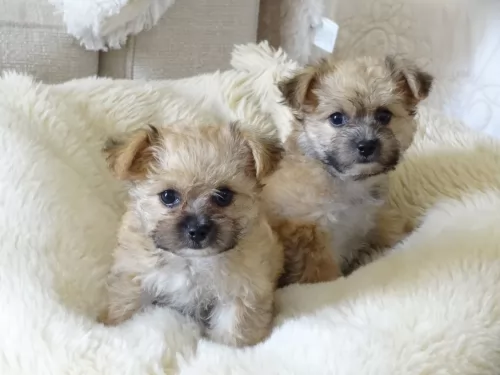 Both the Yorkie and Bichon Frise are dog breeds that are prone to Legg-Calvé-Perthes disease. This is when there is insufficient blood supply to the hind thigh bone, so the dog becomes lame.
Both the Yorkie and Bichon Frise are dog breeds that are prone to Legg-Calvé-Perthes disease. This is when there is insufficient blood supply to the hind thigh bone, so the dog becomes lame.
Surgical correction is necessary. Like small dogs in general, the Yochon might have dental issues. Slipped kneecaps, hypothyroidism and eye problems might affect the Yochon as well.
 1Feeding the puppy – Don’t overfeed – they have a propensity toward obesity. Feed high quality, high protein 3 x a day.
1Feeding the puppy – Don’t overfeed – they have a propensity toward obesity. Feed high quality, high protein 3 x a day.
2.Feeding the adult – Don’t overfeed. Feed a high quality, high protein 1-2 x a day.
4. Games and Exercises – They need space to run and they love to explore. They would also love to be near water where they could swim. Good at dock diving, field trials, flyball and frisbee.
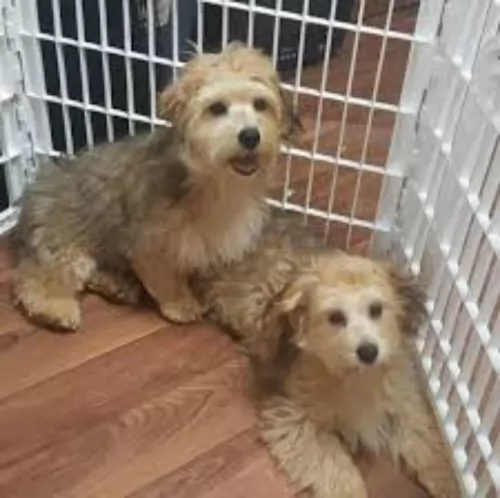 Everybody is busy and they don’t always have time to exercise their pets. As a human being, your health relies heavily on the exercise you get so you and your dog can exercise together.
Everybody is busy and they don’t always have time to exercise their pets. As a human being, your health relies heavily on the exercise you get so you and your dog can exercise together.
These days if you seriously don’t have time and you have money to spare, there are excellent doggy daycare centers where your dog can have fun playtimes with other dogs and people.
Dog exercises will change over time with age but at least try to get used to giving your pet a walk every day as this kind of exercise can extend into old age with both you and your pet.
Swimming, ball games, fetch games and walks or hikes are all great forms of exercise.
Good nutrition ensures your Yorkie Bichon has a good chance to be healthy and energetic. Some of the commercially manufactured dog foods you get are made with bad ingredients and they can make your dog sick.
The good quality ones can be nutritious for your dog and also wonderfully convenient. Always read the packaging labels so you know what your dog’s getting.
Cooked vegetables, boiled chicken and brown rice, nicely chopped up and added to the dry kibble can add variety to your pet’s diet while remaining deliciously nutritious and tasty as well.
Brush your Yo-Chon at least twice a week to keep the hair silky and shiny. Clip your dog’s nails when they get long.
Check inside his ears for signs of redness and the possibility of an infection. Try and look inside his mouth too for bad teeth as this can cause lots of health problems for your pet.
If you don’t have the time to do all these things, there are professional pet groomers who will do all these grooming chores for you.